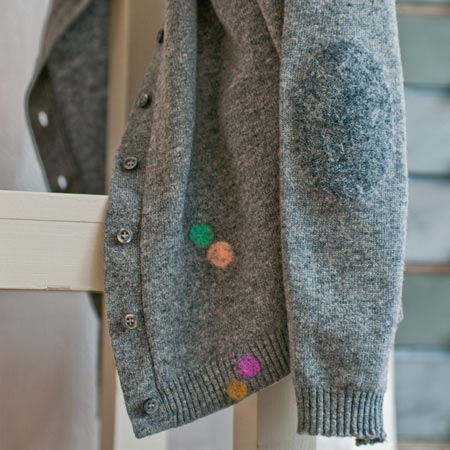Dutch Design Week 09: Amsterdam designer Heleen Klopper has been awarded the €5,000 "incentive prize" at Doen Materiaalprijs 2009 for her system for mending holes in woolen fabric.
Called Wolplamuur (Wool Filler), the invention comes as a kit that allows people to mend holes or worn patches in their clothes by applying wool felt fibres with a needle.
The Doen Materiaalprijs is awarded for innovative use of materials. The main prize was won by Chris Kabel for his Seam Chair and Bench.
Here's some information from the competition organisers:
--
Wool Filler (Wolplamuur)
Wool Filler for mending holes in textiles was born out of a need to repair a hole in a woollen cardigan. The edges of such holes are rarely clean-cut and they are often surrounded by ladders, fraying or worn patches. The differences in thickness and the openness of the structure make felt the ideal solution for mending. Felt, being non-woven, attaches easily to any open structure. Fillers made for materials like wood consist of fibres and a chemical binder. Felt is different: it attaches mechanically by means of minuscule scales. Where once there was a hole, there's now a new piece of fabric.
The DOEN | Materiaalprijs 2009, launched by the Materiaalfonds voor Beeldende Kunst en Vormgeving and Stichting DOEN, challenged designers and artists to come up with a project or idea combining sustainability and innovative materials, beauty and functionality. The prize, awarded this year for the first time, seeks to promote the sustainable and innovative use of materials in the fine arts, design, fashion and architecture. A playground of discarded windmill sails, a chair of sugar-beet waste, wood made out of newspapers or a bird house of fallen autumn leaves: the organisers were astonished at the number and quality of the entries. The nomination commission selected seventeen designs from a total of seventy eight submissions.
The jury (which consisted of Ursula Tischner, Ruud Koonstra and Arnout Visser) was then faced with the difficult task of picking two winners from the seventeen nominated designs. They feel that the seventeen contending projects showed an extraordinary fusion of fine art, design, fashion and architecture and approached sustainable material use from different vantage points. The jury based its final decision on four criteria: sustainability, innovation, aesthetics and use. A number of the nominated projects met the aesthetics criterion but the jury found that they did not fully satisfy the new requirements that apply to sustainable design. In other projects, the materials were innovative but the application still needed improvement.
All of the nominated designs deserve to be exhibited. The knowledge and insights utilised can inspire crucial ground-breaking progress in sustainability and in the innovative use of materials in fine art, design, fashion and architecture.
Jury Report DOEN | Materiaalprijs 2009
Presentation: 17 October 2009 during Dutch Design Week
Location: the Clock Building at Strijp-S in Eindhoven
Jury members: Ursula Tischner (founder of Econcept and lecturer in sustainable product development at the Design Academy Eindhoven), Ruud Koonstra (sustainable entrepreneur/founder and director of Tendris) and Arnout Visser (form-finder and designer).
‘Effective, fun and simple’
The € 5,000 incentive prize goes to Heleen Klopper with Wool Filler.
‘Her design is brilliant in its simplicity. By using the unique qualities of wool – it attaches itself automatically to a surface by means of minute scales – she developed a D-I-Y kit that anyone can use. It’s an easy and original way to repair the holes in woollen garments, rugs, curtains or other textile products. Even the clumsiest person will have no problem using it!
Repairing clothing and other fabric products is an incredibly sustainable activity because it extends the life of sweaters or rugs. You could see wool filler as ‘21st-century darning’. Granny would be proud! It’s amusing, decorative and effective. And the results are unique. And on top of this, it’s fun to do: the members of the jury played with the Wool Filler and enjoyed experimenting with it.’

